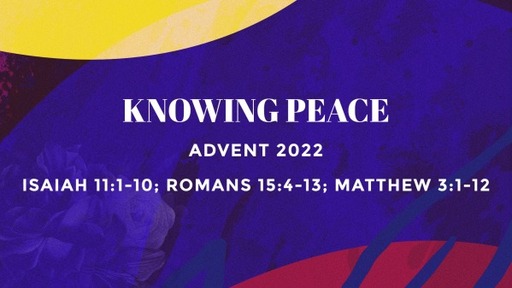Knowing Peace

The “Pax Romana” was being enjoyed at [the] time of Christ’s birth. But, as Epictetus, the distinguished first-century Stoic philosopher, said: “While the emperor may give peace from war on land and sea, he is unable to give peace from passion, grief and envy. He cannot give peace of heart, for which man yearns more than even for outward peace.”
SOURCE: Norval Geldenhuys, The Gospel of Luke (Marshall, Morgan and Scott, 1950), 112 (on Luke 2:14).
We know that there are three comings of the Lord. The third lies between the other two. It is invisible, while the other two are visible. In the first coming he was seen on earth, dwelling among men; he himself testifies that they saw him and hated him. In the final coming all flesh will see the salvation of our God, and they will look on him whom they pierced. The intermediate coming is a hidden one; in it only the elect see the Lord within their own selves, and they are saved. In his first coming our Lord came in our flesh and in our weakness; in this middle coming he comes in spirit and in power; in the final coming he will be seen in glory and majesty.
Because this coming lies between the other two, it is like a road on which we travel from the first coming to the last. In the first, Christ was our redemption; in the last, he will appear as our life; in this middle coming, he is our rest and consolation.
In case someone should think that what we say about this middle coming is sheer invention, listen to what our Lord himself says: If anyone loves me, he will keep my word, and my Father will love him, and we will come to him. There is another passage of Scripture which reads: He who fears God will do good, but something further has been said about the one who loves, that is, that he will keep God’s word. Where is God’s word to be kept? Obviously in the heart, as the prophet says: I have hidden your words in my heart, so that I may not sin against you.
Keep God’s word in this way. Let it enter into your very being, let it take possession of your desires and your whole way of life. Feed on goodness, and your soul will delight in its richness. Remember to eat your bread, or your heart will wither away. Fill your soul with richness and strength.
If you keep the word of God in this way, it will also keep you. The Son with the Father will come to you. The great Prophet who will build the new Jerusalem will come, the one who makes all things new. This coming will fulfill what is written: As we have borne the likeness of the earthly man, we shall also bear the likeness of the heavenly man. Just as Adam’s sin spread through all mankind and took hold of all, so Christ, who created and redeemed all, will glorify all, once he takes possession of all.
In 1930 a movie was made about World War I called “All Quiet on the Western Front.” In one scene some American “doughboys” were talking. A comic character asked, “Where do wars come from anyway?” Another replied, “Well, one country gets mad at another country, and they start fighting.” The first soldier asked, “Do you mean that one piece of land gets mad at another piece of land?” “No,” the other replied. “The people of one country get mad at the people of the other.” The first soldier picked up his rifle and started walking away. When asked where he was going, he said, “I’m going home. I’m not mad at anybody.”
